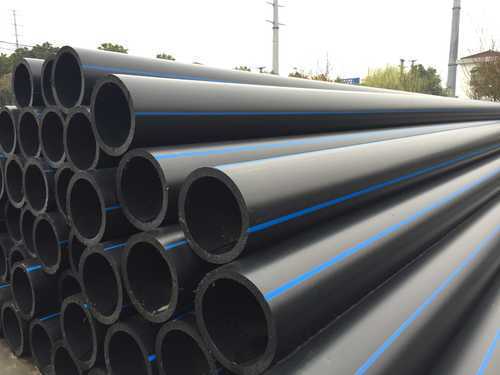High Density Polyethylene (HDPE) Pipes (Fresh Water Pipes) are manufactured using 100% virgin grade HDPE compounds. HDPE Pipe are versatile and utilized in various applications like, Drinking Water transport, Irrigation, Bore wells, Industrial Piping for Effluents, Hot water & waste chemical drainage, Water & Effluent treatment Plants, Fire Fighting Pipelines, Garbage chutes in high rise apartments, Swimming Pool pipelines, Ducting of various cables, Dredging, Slurry disposal by Mines, Society Drainage and many more utilities.
HDPE Pipes have an average life of more than 50 years (as per international studies) under normal working conditions. Our range impart extra toughness and excellent anti-corrosive properties. These products are inert to the adverse effects of chemicals and soil. We offer these Pipes in almost all standards, ISO-4427, DIN-8074 and different grade PE-80 & newly invented PE 100 material approved by international agencies like Bodycote, Germany.
HDPE Pipes are available in sizes ranging from 20 mm up-to 1200 mm OD, and pressure varying from 2.5 Kg/Cm2 up-to 20 Kg/Cm2. We also offer HDPE Pipes as per client needs.
HDPE Pipes delivers exceptional value, unwavering reliability and remarkable advantages over conventional types of piping. Other reason HDPE is a superior choice:
Long-term service life
Highly-resistant to corrosion, abrasion and chemicals
Strong, durable, flexible and lightweight
Longer-length pipe with leak-proof joints
Lower labor requirements for installations
Significant overall cost savings
Potable Water Application:
HDPE High Density Polyethylene (HDPE) Pipe has been used in Potable Water applications since the ’60’s, and has been gaining approval and growth in municipalities ever since.
HDPE Pipes are specified and approved in DIN 8074 / 8075 and ISO 4427. Some distinctive advantages of HDPE pipe that provide important benefits for water applications are listed below:
HDPE Pipe can be heat fused together to form a joint that is as strong as or stronger than the pipe itself and is leak free. This eliminates the potential leak points every 10-20 feet as found with PVC and Ductile Iron bell and spigot connections and life cycle cost of HDPE pipe differs from other pipe materials because the “allowable water leakage” is zero rather than typical leakage rates of 10 to 20% for PVC and Ductile Iron.
HDPE pipe fused joints are self restraining and costly thrust restraints or thrust blocks are not required. HDPE pipe’s fused joints simply do not leak, eliminating infiltration and exfiltration problems experienced with alternate pipe joints.
HDPE pipe can be bent to a radius 25 times the nominal pipe diameter (Example: 12” HDPE can be cold formed in the field to a 25ft radius). This can eliminate many fittings required for directional changes in a piping system where fittings and thrust blocks or restraints are required with alternate materials.
The flexibility of HDPE pressure pipe makes it well suited for dynamic soils including areas prone to earthquake. HDPE pressure pipe can accept repetitive pressure surges that significantly exceed the static pressure rating of the pipe.
The combination of flexibility and leak free joints allow for unique and cost effective types of installation methods that the rigid PVC and Ductile Iron pipes can’t use with bell and spigot connections. These alternate installation methods (Horizontal Directional Drilling, Pipe Bursting, Sliplining, Plow and Plant, Submerged or Floating Pipe, etc.) can save considerable time and money in most potable water applications.
HDPE Pipe is produced in straight lengths up to 50 Meters long and coiled in diameters up through 3”. Coiled lengths over 1000ft are available depending on size providing low cost installations.
Polyethylene is about one-eighth the density of steel, it does not require the use of heavy lifting equipment for installation.HDPE Pipe installations are cost effective and have long term cost advantages due to its physical properties, leak free joints and reduced maintenance costs.
HDPE Pipe industry estimates a service life for HDPE pipe to conservatively be 50-100 years. This relates to savings in replacement costs for generations to come.
HDPE Pipe will not corrode tuberculation or support biological growth. HDPE pipe has superb chemical resistance and is the material of choice in harsh chemical environments the advantages of corrosion and chemical resistance over traditional metal pipes are shared by many plastic pipes, but HDPE pipe uniquely combines these attributes with the aforementioned advantages of heat fused joints, flexibility and fatigue resistance.
HDPE Pipe much easier to handle and install vs. the heavier, rigid metallic or concrete pipe segments, allowing for huge cost advantages in the construction process. Polyethylene pipe is better able to structurally withstand an impact than PVC pipe, especially in cold weather installations when other pipes are more prone to cracks and breaks
